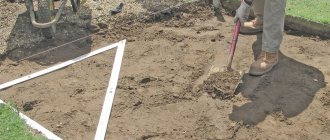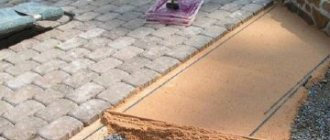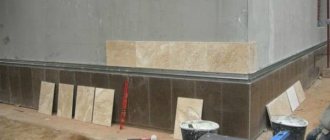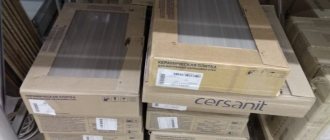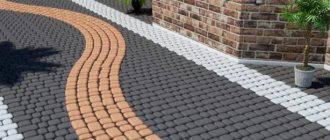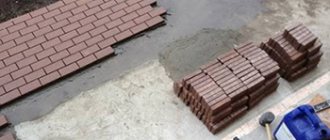Is the old coating no longer so bright and no longer pleasing to the eye? You can update your yard, garden paths or other area with the help of modern paving stones, made in different shapes and types.
Paving stones are popular among buyers. It has an aesthetic appearance and good characteristics. It can be laid in summer cottages, in city parks or other areas with high and low traffic.
Paving stones can withstand heavy loads and intensive use, and are resistant to temperature changes and moisture. But in order for the coating to serve for many years, you need to take care of the base and binder for it.
What to do if the old coating is still durable, but already has an unattractive appearance? It can be removed, but you need to spend a lot of time and effort. In order not to remove the old coating, but at the same time lay new tiles, buy special glue.
An adhesive base is available for sale for interior or exterior use. This tool allows you to lay tile products of any type and size in a horizontal or vertical position. The mixture can be dry or sold as a ready-made solution in 5-20 kg jars. The adhesive substance holds the product and the concrete base together in a matter of hours, creating a new, durable surface.
Adhesive compositions differ not only in components, but also in properties. When choosing a material, you should know what requirements it must meet.
Choosing adhesive for paving slabs
When choosing a composition, keep in mind that the requirements for such products are higher than for substances for interior work. Neglecting one of the required characteristics may result in the tile “falling off”.
The composition for paving stones should have:
- High-quality basis;
- Resistance to negative temperatures;
- Suitable for paving stones;
- Good elasticity after hardening;
- High adhesion;
- Suitable for outdoor or indoor use.
Only if these properties are present can the product be called high-quality.
Types of frost-resistant tile adhesive
It would seem that there may be differences between adhesive bases for attaching street tiles, but they differ in composition, which changes their additional properties.
There are several types of mixture:
- Cement base. This glue is the most common. Budget-friendly and recognized by all construction and finishing specialists.
- Immediately ready for use. Suitable for any surface and have excellent bonding properties.
- Based on polyurethane. They have high elasticity rates. That is why they are considered an ideal option for complex structures with irregular geometry.
- Based on epoxy resins. Most often they are composite, i.e. To work, you need to add a hardener in addition to water. Protect surfaces from moisture and damage.
In addition to the main ones, there are many other additives to adhesive mixtures. Due to the wide variety, you can always choose the composition specifically for your needs.
Glue base
To lay paving products on the street, choose substances whose main components are:
- Cement base (cement, sand, plasticizers). Hydrophobic stabilizing additives or liquid glass can be used as a plasticizer. Such compositions can be purchased dry in paper bags, packaged 25 kg and marked C1 or C2. They are widely used not only when laying paving slabs, but also for any external and internal work. The mixture has a low price, as well as good adhesive properties, which makes it in demand among buyers.
- Polymer adhesives. They are water-soluble ground resins. The polymer composition can be one-component, two-component or multi-component (mixed). The polymer composition is characterized by rapid fixation and high elasticity. It is sold ready-made in plastic containers of various sizes and is marked D1-D2. The solution can be used for interior and exterior work. Finishing with polymer adhesives is possible on a vertical wall. The solution does not need to be diluted with water, but can be used immediately after purchase.
Varieties
Depending on the main material, adhesive for paving slabs and paving stones can be divided into two types:
1. Cement-based adhesive The adhesive consists of ground cement, sand and various plasticizers (usually liquid glass or stabilizing substances). At the same time, the mass fraction of sand with cement is 90%, and plasticizer components are 10%. Frost-resistant paving adhesive usually consists of a cement base. Once hardened, this glue creates a monolithic joint with a high level of strength.
Provided that the technology for laying paving stones is followed, cement adhesive mixtures completely fill the voids, thereby protecting the surface from deformation. Cement adhesive is ideal for paving on concrete bases. It has excellent adhesion, is characterized by elasticity, resistance to moisture and temperature changes.
These mixtures are sold in the form of dry powder in durable paper bags. Thanks to the excellent combination of relatively low price and good gluing quality, this glue is widely popular.
2. Polymer adhesives Polymer-based adhesives are more complex in composition and are made from water-soluble polymer resins. It is characterized by incredibly strong and quick fixation and excellent ductility, which allows it to be used even for complex substrates.
Polymer mixtures can be single-component, two-component, or with a mixed multicomponent composition. The glue is available in plastic containers of various sizes, completely ready for application. This allows you to start paving immediately, which significantly saves time and effort. the cost of polymer glue can be several times higher than similar cement-based glue.
At the same time, its cost is compensated by quality and service life. Polymer adhesive mixtures cope much better with increased loads in places with a large flow of pedestrians or vehicles, as well as near fountains, ponds, swimming pools and all kinds of decorative reservoirs. Scope of application
Paving adhesive is used when installing paving stones. It is used for paving driveways, paths to the house and other local areas, pavements, street parking lots, sidewalks, squares, various pedestrian areas in parks and squares.
Polymer adhesive for paving stones is more water-resistant, which allows it to be used for laying tiles and stones near ponds and swimming pools. The unique composition allows it to withstand regular exposure to humidity.
The most common problems that arise when using paving stone surfaces:
- loosening and falling out of paving stone elements;
- the appearance of an unsightly gray coating;
- overgrowing of the joint space with weeds.
Due to improper installation techniques, even high-quality paving stones after several years of use may look much worse than you expected. This may occur due to a poor-quality load-bearing concrete layer, the use of inappropriate paving materials, or lack of drainage. Adhesive for paving stones on concrete will help prevent such adverse consequences. Recommendations for carrying out the work Laying paving stones yourself is a labor-intensive process that requires precision and strict adherence to the sequence of work. But with certain knowledge, it is quite possible to achieve excellent results. When choosing adhesive for paving stones, be careful; even the same manufacturer has adhesive for different applications.
Be sure to consider the degree of load on the surface. Paving stones can be laid both on the sidewalk and in a parking lot. The surface load on these objects is completely different.
Special glue will significantly increase the cost of work, since it is more expensive than homemade cement mortar. In this case, you should not save, otherwise you will have to redo all the work again. It is very important to properly organize rainfall drainage. The following recommendations must be followed:
- To obtain a durable, high-quality coating, stone laying should begin with the preparation of a concrete base. Before starting work, you need to clean the surface of dirt, remove any remaining mortar and other uneven surfaces. Then the base is treated with a primer.
- If you are using cement-based glue, it should be diluted according to the manufacturer's instructions. This will help avoid unpleasant surprises. If the proportions are not observed, the resulting mixture will not have the declared properties. This will negatively affect the strength of the paving stones. Polymer-based adhesive is sold ready for application. Please note that at air temperatures above +30 C, before applying glue, the base must be moistened.
- It is more convenient to apply adhesive for paving stones and paving slabs using a notched trowel. This way you will fill existing microcracks and unevenness faster and more reliably. The adhesive layer can be within 3 cm. The stones are pressed into the solution with little force, then their position is adjusted. Please note that polymer glue sets quickly, so you will have little time for adjustments. It must be applied to a smaller surface and in a thinner layer.
After the paving stones have dried and set with the base, you can begin filling the joints with a special grout for paving stones. Do not neglect this procedure, as it seals the seams and prevents moisture from penetrating and destroying the paving stones.
Frost resistance
When purchasing a dry or liquid mixture, you must be sure that during frosts or sudden temperature changes, the paving stones will remain in place and the adhesive will not lose its properties. When purchasing, read the labels; manufacturers often indicate the area of application of the product and the temperature at which it should be used.
To increase frost resistance, manufacturers add liquid glass or hydrophobic additives. If there are a lot of hydrophobic additives, then a minimum of water is needed. The presence of liquid glass significantly increases the number of defrosting and freezing cycles. The purchased composition must withstand 100 cycles of freezing and thawing, while maintaining its original properties.
Attention:
Do not confuse frost resistance and the minimum temperature for using a substance. A substance with a minimum permissible temperature below zero is no different from compositions that must be applied at temperatures above zero.
Required tools and materials
In order to properly lay paving slabs yourself, you will need some construction tools:
Building tools
- wooden or metal pegs;
- construction level;
- cord or thick rope;
- rubber hammer;
- shovel;
- tamping;
- rake;
- spatula or construction trowel;
- long rule;
- wheelbarrow;
- buckets;
- Bulgarian;
- broom.
Many tools will be found in the household of any summer resident; you will not need to spend money to purchase them. In addition to the main material - paving slabs, you will also need other building materials:
- sand;
- crushed stone or gravel;
- geotextiles;
- cement;
- curbstone;
- water.
These materials will be needed to lay the base for the tiles.
Elasticity after hardening
When walking or driving, there is a load on the paving stones. If the coating is very hard, then under intense loads the material will quickly become unusable. The elasticity of the composition will create a shock-absorbing cushion and will transfer the load to the concrete base, maintaining the integrity of the tile product.
The elasticity indicator can be seen on the packaging. Elasticity is indicated as S1-S2, where:
S1 - means that the glue can withstand a deflection of 2.5 mm.
S2 - indicates that the substance has high elasticity, so it can be used for surfaces with heavy loads. The adhesive and tiles can withstand deflection up to 5 mm.
Tiles with elasticity index S2 will retain their appearance for a long time, which means they will last longer.
What requirements must be met for the glue?
The most important thing that any street glue should be able to do is firmly hold any materials together. To select such a composition, pay attention to the following indicators:
- Strength in stone;
- The degree of surface adhesion;
- What loads is the composition designed for?
If frost-resistant tile adhesive has all these indicators at a low level or is completely absent, then it is better to refuse to purchase it.
Glue class
Each composition has its own class. Adhesive for paving slabs is divided into 2 classes:
- Class 1 – adhesive mixture intended for light tiles. Used for finishing work inside heated rooms. It can also be used in underground passages or shopping centers together with underfloor heating systems.
- Class 2 – a mixture that can be used for any outdoor work. It provides strong grip on light or heavy paving stones.>
For any outdoor work, choose a class 2 substance. Its cost will be higher than 1st class funds, but this price is justified. If you decide to save on class, you will lose much more, since the tiles will not stay in place for long, and very soon you will have to do the repairs again.
Rating of the best brands
Only experienced craftsmen, those who specialize in performing external finishing work, can make a rating of the best frost-resistant adhesive compositions. Among other assortments, they highlight three brands of adhesives: “Ceresit” (Ceresit) CM 17. “Ceresit” (Ceresit) CM 117. “UNIS” (Unis) 2000. They have proven themselves well, these compositions successfully withstand the difficult conditions of the Russian climate.
- "Ceresit" CM 17 boasts high adhesion and excellent elasticity. It can be used for laying tiles outdoors in the winter season. Its frost resistance is approximately one hundred cycles. This composition is well suited for working with artificial porcelain stoneware. You can work with such glue at temperatures from -50 to +70 degrees.
- "Ceresit" CM 117 is used to work with any external facing material (except heavy marble). Using it, you can glue the tile material to a cement base, to a concrete base and to a limestone base. In addition, experienced tilers often use mixtures of a similar brand for tiling outdoor outdoor pools. Frost resistance – more than one hundred cycles.
- "UNIS" (Yunis) 2000 is close in its technical characteristics to the two previous formulations. There is only one difference: frost resistance is only forty cycles, the time reserve for adjustment is only 10 minutes. You can work with such glue at temperatures from -50 to +50 degrees.
Note! To carry out external work, it is necessary to purchase adhesives whose technical characteristics correspond to the technical characteristics of the above three compositions.
When purchasing this or that adhesive composition, you must pay attention to the production date and expiration dates.
Adhesive brands for paving slabs
The construction market offers a large number of compounds that are suitable for fixing paving slabs. Some of the best are:
- Cerrasite adhesive mixtures from the manufacturer Ceresit. Substances are sold in dry form and are sold in paper bags. Before use, the product should be diluted with water and brought to the desired consistency. Such products are intended for external use. To choose the right solution, read the manufacturer's recommendations.
- Knauf-Fliesen. The mixture is used for natural or artificial stone. Can be used for laying paving stones indoors and outdoors. Provides proper quality of adhesion to vertical as well as horizontal surfaces. It goes on sale in dry form, packaged in bags. Requires preliminary preparation before use.
- OSNOVIT T-14 (AC14) from the company Osnovit. Designed for cladding all types of surfaces with natural stone, as well as clinker or concrete paving stones. The mixture can be used for external and internal work. It is supplied dry and therefore requires preliminary preparation.
On sale you can find universal mixtures that are suitable for all types of paving stones and bases. But, such options should not be chosen since the strength of their adhesive connection will be lower.
When the adhesive has been chosen, all that remains is to lay the tiles.
Manufacturers
The range of modern adhesive mixtures is constantly growing and amazes with its diversity. As practice shows, the adhesive ability of universal mixtures with incredibly wide areas of application is significantly lower than that of specialized solutions. Therefore, when working with stone and granite, you should choose a specialized adhesive for paving stones. Let's look at the most popular manufacturers of paving stone adhesive.
Perel
One of the largest manufacturers of masonry mortars and adhesive mixtures in Russia. All products are created using high-quality European equipment from high-quality imported components in compliance with international quality standards. Perel present a wide range of adhesive solutions for paving stones and natural stone slabs. The adhesive is made on the basis of durable white cement, quartz sand and European polymer components. Intended for use in outdoor conditions, designed for light to moderate traffic impact.
Quick-mix
The German company is a developer of unique products for paving paving stones and paving stones. The system was called “tubag Trass”. Quality quick-mix TDM route drainage mixture is made from route and cement components and is ideal for various types of paving stones. Special components make it possible to lay a permeable load-bearing base with a void ratio of 15-20%, thereby reducing the likelihood of destruction of the paved surface due to freezing of standing water.
Ceresit
This company offers high-quality frost-resistant adhesive for paving stones and tiles. The price-quality ratio of tile mortar significantly influenced the popularity of the product.
Perfecta
The Russian manufacturer sells Linker Landshaft Fix adhesive with increased elasticity, designed specifically for gluing stone and paving stones to a concrete base. The mixture is designed for medium to low traffic loads. Recommended for use for paving terraces, paths and other areas for long-term protection from moisture.
Knauf
Expensive and high-quality adhesive mixtures guarantee frost resistance for 150 cycles and are able to withstand significant transport loads. Designed for laying stone and granite.
You can purchase high-quality adhesive for paving slabs and paving stones from the best domestic and foreign manufacturers in our online store. We sell only original frost-resistant adhesive mixtures from Quick-mix and Perel. You can buy paving stone adhesive from us at the best price. Our consultants will help you with choosing and placing an order.
How to lay tiles with adhesive
By following the technology of laying tile material, you can perform high-quality laying of paving stones yourself. To do this you need:
- Clean the base from dirt and dust. In order for the reaction of the concrete base and the adhesive to be quick, the surface must be clean. For cleaning, you can use the hydro-jet method. A suitable tool for this would be a Karcher type home appliance.
- If paving stones are laid on garden paths, then it is necessary to provide formwork. Wooden formwork installed along the contour will not only allow you to lay the paving stones evenly, but also avoid unnecessary consumption of material.
- Preparation of the composition. To properly dilute the composition, read the manufacturer's instructions. Follow the recommendations strictly. Mix the dry mixture with water in the amount specified by the manufacturer. Do not try to save money, as you will end up with a completely ineffective solution.
- Apply the binder composition to the base. This can be done using a notched trowel. It is not necessary to lubricate the entire concrete surface, but only the part where the tiles will be laid. The bonding agent “sets” quickly, so if applied to the entire surface at once, you will not be able to properly glue the paving stones. Laying the tiles. Place the selected samples on a greased surface and press down slightly. We leave a small gap between the tiles, which will be filled with adhesive upon completion of installation.
Features of masonry on concrete
The main feature of the whole process lies, again, in the concrete base, which, first of all, provides the tiles with a long service life. However, many finishing specialists often do not want to take on this technology because of its complexity - just one small mistake made during work will not allow the coating to “overwinter” even for one season.
Laying paving slabs on concrete is possible only when drainage and drainage have already been done for the future site.
This will ensure effective drainage of water from the paved surface, and moisture, as you know, is the “sworn enemy” of tiles. Getting into its micropores and small cracks, when freezing, water increases in volume and destroys the material from the inside.
How to make adhesive for paving slabs yourself
In order to properly lay garden paths, arrange a local area, a parking lot or other area, it is not necessary to buy glue for paving slabs. To make the substance at home you will need:
- Cement PC-400;
- Clean sifted sand;
- Plasticizer.
Liquid Cerrazit SS 83 can be used as a plasticizer. It gives the mixture strength and mobility. The amount of additive is indicated on the packaging. Water is added to the resulting mixture in small portions. Water and the dry mixture are diluted to the required proportions, and then the solution is used for its intended purpose.
Preparation of the adhesive composition
To prepare the working solution you will need the following tools:
- mixer or drill with attachment;
- container for mixing glue and water;
- Master OK.
Stage 1. Measure out a certain amount of mixture and the required amount of water.
Stage 2. Pour water into a container and add the dry mixture to the water.
Stage 3. Mix the components using a mixer or drill with an attachment at low speed.
Stage 4. Wait 5-10 minutes - this is necessary for the components of the mixture to react. Then mix the solution again. The mixture should fall from the spatula, but not freely.
Stage 5. Wash the kneading tool in water, as the solution sets quite quickly.
Stage 6. If there are lumps, the mixture must be stirred again.
Attention! You cannot add water to the prepared solution.
Making your own glue
You can make the adhesive composition yourself. To do this, when preparing cement mortar, you need to add a plasticizer to it. The amount of additive is indicated on the solution packaging.
Thus, in order to lay tiles for a garden path efficiently and inexpensively, you need to do the work using frost-resistant glue, which will reliably fix the tiles in adverse environmental conditions.
Average score of ratings is more than 0
Share link
Comments There are no comments yet, but you could be the first...
How to install
You need to have certain skills to perform cladding using frost-resistant compounds. They are selected taking into account the regional climate zone.
If the temperature does not drop below ten degrees, then it is quite possible to use a solution of cement and concrete.
You need to be able to apply the glue correctly, that is:
- Dilute the composition correctly, following the instructions in the instructions, and apply it to the wall or floor with a special notched spatula;
- Before starting work, the main surface must be cleaned of traces of dirt and treated with a layer of primer;
- In practice, an additional agent is used for the top layer, sprinkling tiles or porcelain tiles with a small amount of cement before laying, which is considered an excellent means of binding water particles. It is usually formed by tapping a rubber hammer on a tile surface. This allows the adhesive mass to be evenly distributed over the entire surface. The presence of frosty weather can interfere with traction if the moisture freezes;
- Before installation, you can additionally spray PVA glue on the back. If PVA is not available, you should moisten the back side with water and then sprinkle it with cement paste.
After all the steps have been carried out, the work is carried out according to the same algorithm as the cladding of the interior. A competent approach and responsibility will allow you to realize your plans and delight your owners with their appearance for many years.
